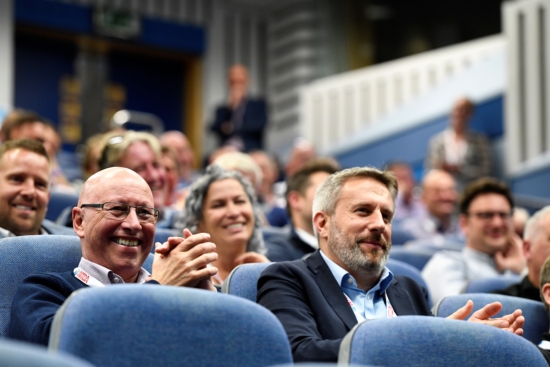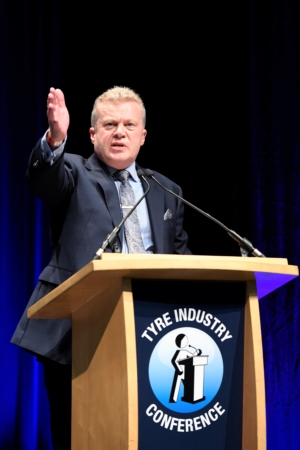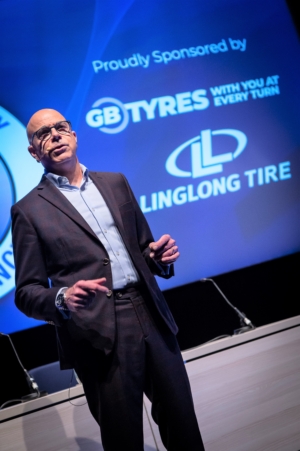Cross-industry cooperation more important than ever – NTDA chief exec
 The first industry-wide in-person event of its kind since lockdown, the NTDA conference was well attended (Photo: NTDA)
The first industry-wide in-person event of its kind since lockdown, the NTDA conference was well attended (Photo: NTDA)
NTDA chief executive Stefan Hay’s NTDA Tyre Industry Conference 2021 speech covered a range of pressing topics, that – due to the impact of the pandemic and its associated lockdowns – couldn’t be addressed in-person before now: key worker lobbying, climate change and the importance of training and technicians were amongst the main topics.
Hay began by giving an overview of what has taken place since the last conference in 2019. “When I stood before you in 2019, the United Kingdom was in turmoil. We were two months away from a general election we had no idea if a Brexit deal would be reached and the media told us that without one, Christmas would be cancelled (well that now seems to have become an annual announcement and whereas in 2020 we had plenty of food but no family allowed for Christmas this year, apparently, we can have family but won’t have anything to feed them with).
From here, Hay moved onto the subject of climate change, a topic that brings with it the wider theme of sustainability – something that is gaining more and more attention across the tyre business and in the UK. “Then, after a year of Greta Thunberg, Sir Richard Attenborough and Extinction Rebellion warning us about the pending climate disaster on an almost daily basis, we still found ourselves totally unprepared to deal with a wave of devastating flooding in the UK which started in November with further major incidents caused by Storms Ciara and Dennis, carrying on until February 2020.”
Later in the Speech Hay sought to illustrate the urgency of the issue: “If no mitigating action is taken, global temperatures could rise by more than 3 degrees Celsius and the world economy could shrink by 18 per cent in the next 30 years.” With this in mind, “tyre manufacturers, wholesalers, retailers, repairers, re-treaders and re-processors all have a significant responsibility and role to play in saving the planet for future generations, and many are already engaged in wonderful projects working towards this, but our efforts must be co-ordinated and highlighted.
Hay also paid tribute to the UK logistics sector and – of course – the hardworking men and women in the tyre industry that have kept Britain rolling throughout:
“We have experienced, first-hand, how fragile our global consumerism-based society truly is with food, fuel and other item shortages becoming the norm…In many ways, the tyre retail and associated aftermarket has fared better than most sectors over the last 2 years and of course the NTDA and our fellow trade bodies, such as the IGA, lobbied to ensure garages were classified as essential services and could remain open during the lockdowns.
“Commercial tyre fleet management and roadside response remained positive, primarily due to the fact that commercial vehicles were always on the road delivering food and other essential goods.
“There was also a significant increase in demand for mobile tyre response services as more motorists required tyre technicians to come to their homes, so again we lobbied to ensure tyre technicians were recognised as key workers and introduced the tyre technician key worker card.”
MOT/motor vehicle repair ‘a key area for growth’
Then, highlighted the growing opportunities for tyre garages in the MOT and motor vehicle repair space: “according to the ONS, from February 2021 onwards a key area for growth in the services sector has been the repair of motor vehicles, but we are certainly not out of the woods and are now faced with many issues, over which we have no control such as the MoT backlog…”
One ongoing issue is recruitment, training and retention in the tyre business: “I have often heard it said, that we’ve lost all of our EU workers, that’s why we have such a skills shortage, but the truth of the matter is, that our sector, like most sectors, has for decades failed to invest in skills development.
“In a 2019 Employer Skills Survey research report published in October 2020, the UK Parliament’s Education Committee found that UK employer-led training had declined by half since the 1990s, with 39 per cent of employers admitting to not training any of their staff in the previous year. This lack of training is one of the main reasons for the UK’s poor productivity performance and why skills shortages will continue to persist for decades to come” – a point NTDA national chairman Martin O’Brien also referred to in his speech.
‘Automotive technicians must be respected…’
Change is for everyone, but evolution is for the motivated” – Marsh Commercial CEO, Anthony C Gruppo kick-started the conference sessions themselves (Photo: NTDA)
So, what’s the answer? “We need long-term solutions now and professional tyre and automotive technicians must be respected and financially rewarded for their experience and hard work, because as I have consistently said, they are the people, out there day after day, keeping Britain moving and we can’t afford to lose them to online retailers to work as delivery drivers because they get paid more to drop off parcels than to use their technical skills to service or repair a vehicle.
“We need more tyre technicians, we need more service technicians, we need more MOT testers now and simply poaching from each other, hoping that, and I quote ‘the big boys will fill the void with their internal apprentice programmes’ or that government will find a solution sometime soon is pure short-termism and is not sustainable.
“Customers also need to be more realistic and work in partnership with tyre distributors, especially when it comes to fleet work and roadside response. Some of the terms and conditions under which our members are being asked to work are simply unreasonable. NTDA members provide a 24-hour on call breakdown service. They cannot be expected to provide a fully staffed, fully managed, 24-hour we-are-always-available-to-work-because-we-never-sleep-service.”
Cooperation and trade associations more important than ever
All this means cooperation within the industry – something trade associations by their nature are at the centre of – is more important than ever: “Probably not since the post-war era have trade associations been more needed and more relevant than today and to those companies out there who operate in isolation and refuse to join and engage, I have to say listen to what our “national chairman” has to say about just what the NTDA and its members are doing to take our industry forward.”
Overall, after a year of tragedy, turmoil and change, NTDA chief executive Stefan sought to look to the future, with a speech emphasising such complementary issues as recruitment, training and retention; opportunities in the MOT and repair; and climate change – all themes that were returned to in the rest of the conference and will no-doubt be chewed over more moving forward.



 ONS
ONS
Comments